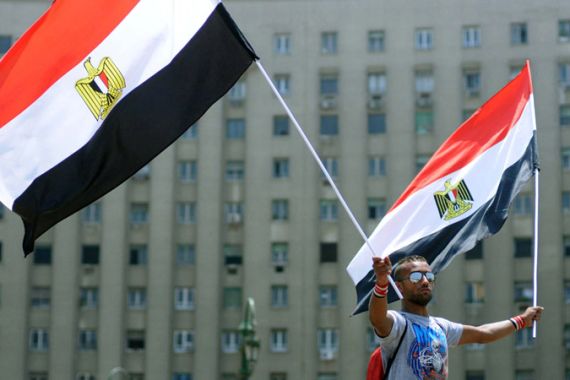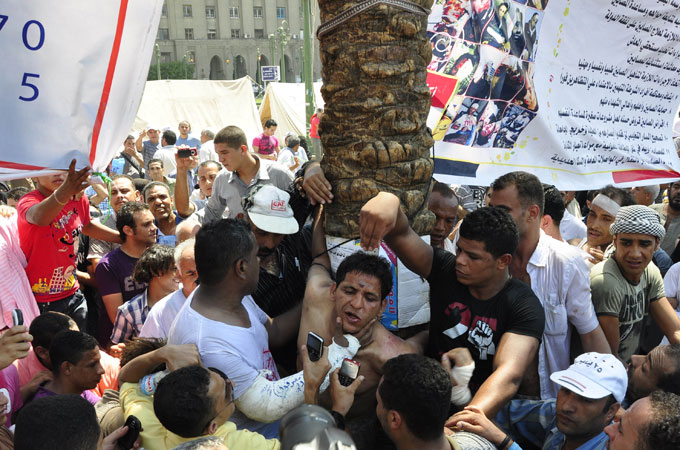Egypt’s deputy PM resigns amid protests
Unpopular politician Yehia el-Gamal quits as sit-in at Tahrir Square enters fifth day.

 |
|
SCAF releases a statement warning protesters against ‘harming public interests’ [Reuters] |
Essam Sharaf, Egypt’s prime minister, has accepted the resignation of his deputy, whose removal had been called for by protesters, the cabinet’s Facebook page has said.
Yehia el-Gamal had previously offered his resignation but it was rejected by the ruling military council, who are now under new pressure from demonstrators camping in Tahrir Square for a fifth-day of protests seeking faster reforms.
Earlier on Tuesday, an Egyptian court sentenced Ahmed Nazif, Egypt’s former prime minister, to a one-year suspended jail term.
Two other ministers from Hosni Mubarak’s, the former president, cabinet were also sentenced to prison for fraud, judicial sources said.
Habib al-Adli, the former interior minister and one of the most reviled members of Mubarak’s administration because of the brutality of his police force, was sentenced to five years and former finance minister Youssef Boutros-Ghali received ten years.
Al-Adli and Boutros-Ghali, who is being tried in absentia, have both been sentenced in other cases. This was the first time Nazif has received a court conviction.
The three were fined $15.6m and are to return the same amount to the state. Boutros-Ghali and Adli were fined another approximately $16.9m, sources told the AFP news agency.
Tahrir Square protests
Thousands of people have gathered in Cairo’s Tahrir Square to show their anger at the slow pace of reform.
“What protesters have been asking for consistently since the end of the revolution has been free and open trials for members of the former regime as well as policemen and police officers involved in the killing of protesters throughout that 18-day revolution,” Al Jazeera’s Ayman Mohyeldin, reporting from the square, said.
“People here are extremely frustrated with the slow pace of judicial cases both the killers of protesters and the former regime.
| Military Statements | ||||||
|
Demonstrators have continued to lay siege to Cairo’s largest government building and threaten to expand their sit-in to other sites in the capital.
“For the first time a protest march on to the prime minister’s office,” Mohyeldin said.
“This is now all building until Friday, because by the end of this week the prime minister has announced that he is going to reshuffle his cabinet and meet all the demands of the revolution.”
Earlier on Tuesday, a group of armed men attempted to disrupt the sit-in at the square, injuring at least eight people, security sources told Al Jazeera.
The men approached the square and attempted to force their way into the central space. More than 1,000 demonstrators continued their protest after the altercation.
Such attacks were common during the 18-day uprising that led to the exit of Mubarak.
Demonstrators say they remain frustrated with the pace of change in Egypt, after the head of the security forces defied orders from the prime minister to dismiss police officers who had been accused of killing protesters during the uprising against Mubarak.
Protesters have been camping out in Tahrir Square, as well as in Suez and other cities, since Friday, demanding the resignation of the interior minister, a more active purging of the bureaucracy of former Mubarak loyalists and a plan to overcome economic issues.
Courts’ transparency
Sharaf and the Supreme Council of the Armed Forces (SCAF) have been on the offensive since the sit-in at Tahrir began.
“Over the past 72 hours we have now seen two statements from the Prime Minister Essam Sharaf and the statement that was released today by the Supreme Council of the Armed Forces,” Mohyeldin said.
“Neither of those statements seems to have done anything to alleviate the anger that exists among the protesters.”
 |
| Protests in Tahrir Square enter fifth day [AFP] |
Egypt’s High Judicial Council instructed on Tuesday that courts hearing cases involving members of the former regime and those involved in the killing of protesters be held in courtrooms that can accommodate the largest amount of attendees as possible.
The courts have also been instructed to provide a closed circuit telecast of court proceedings in adjacent rooms for anyone who wishes to attend.
The decision came after Sharaf and the minister of justice met with the general prosecutor to explore ways on making the trials more transparent for the public.
‘Harming public interest’
The SCAF has released a statement on Tuesday warning protesters against “harming public interests”.
The statement reiterated steps announced several times over the last few month that the military ruling council would hand political power to a civilian administration after elections.
General Mohsen al-Fangary, SCAF’s spokesperson, said the council is committed to holding parliamentary elections, followed by the drafting of a new constitution and then presidential elections.
“The Supreme Council of the Armed Forces stresses that it will not renounce its role in managing the affairs of the country during this critical time in Egypt’s history,” al-Fangary said in a speech broadcast on state television.
The armed forces, which were hailed as heroes at the start of the January 25 uprising for not shooting on protesters, have come under fire for using Mubarak-era tactics to stifle dissent and maintain an absolute grip on power.
They are growing increasingly frustrated by the protests, blocking major roads and a government building.